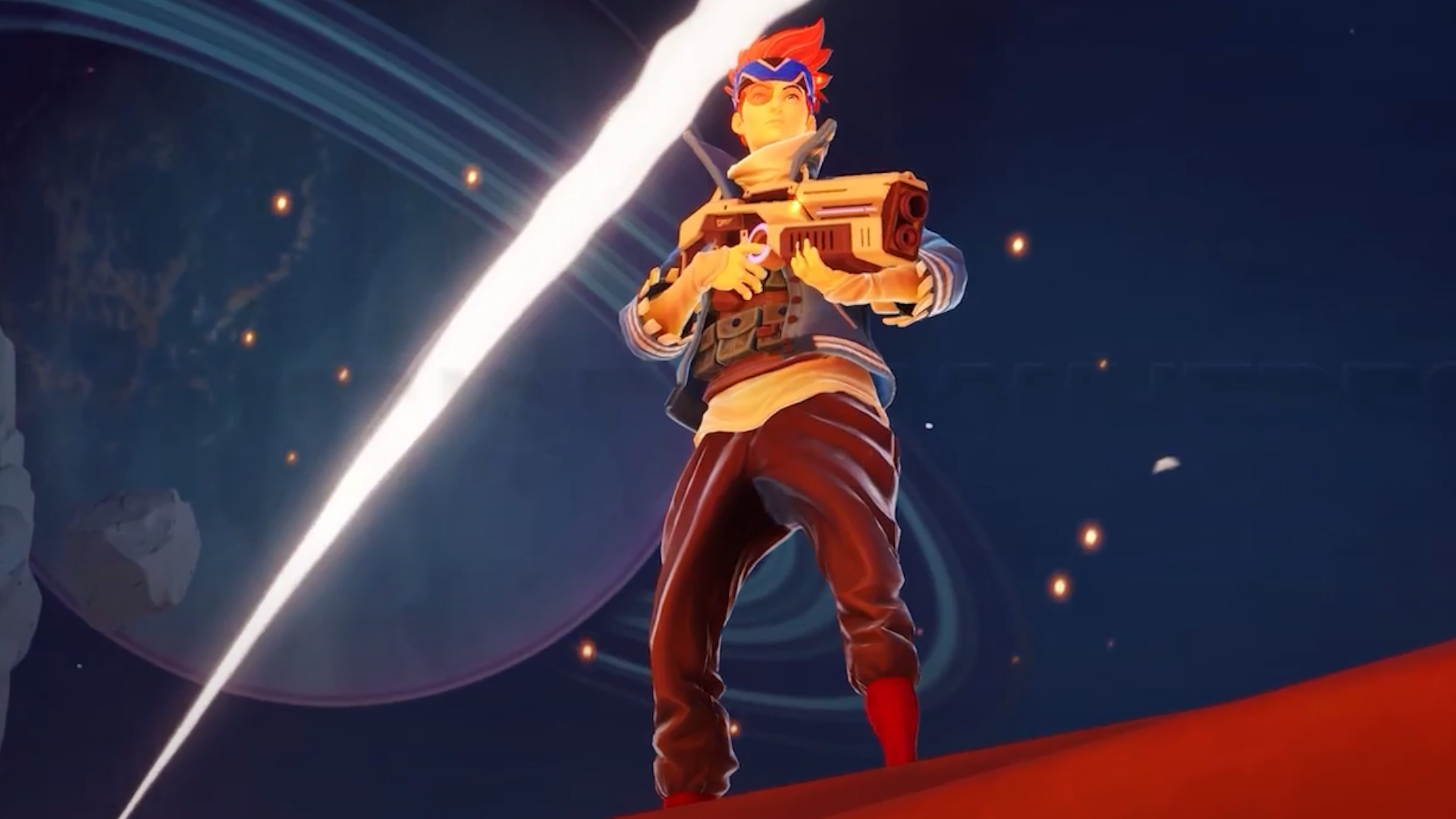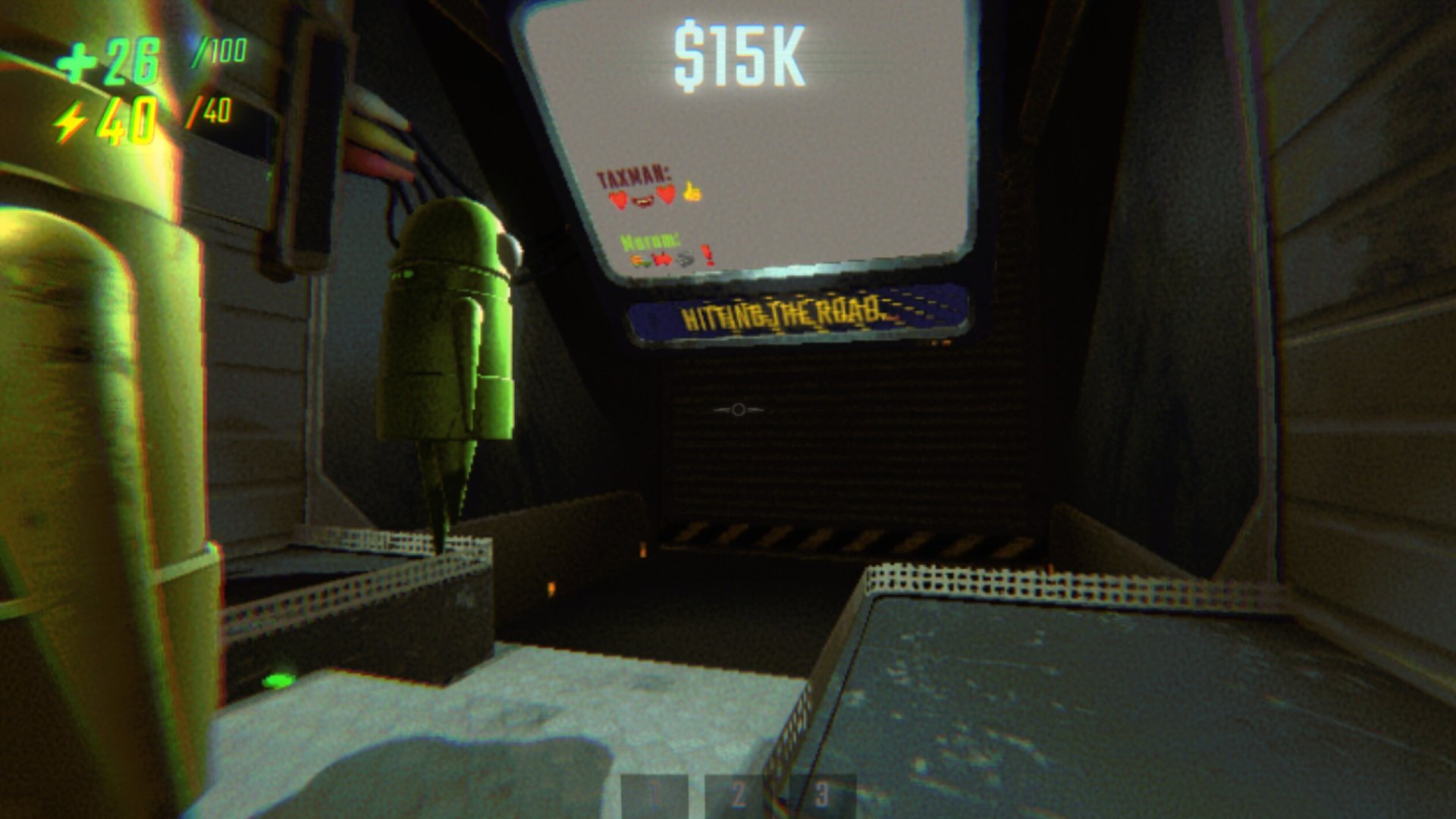One thing will always remain true about players: give them a sandbox and a set of tools, and they’ll make just about anything, everywhere. That’s what Everywhere (the game) sets out to do. Here’s our clip from the PC Gaming Show, though I’ll be summing up my own experiences at-length as well.
I flew to Scotland to visit the studio of Everywhere’s developers, Build a Rocket Boy, and watched a proof-of-concept presentation. I also spoke one-on-one with Adam Whiting, the studio’s assistant game director.
Everywhere is a game with one of those pie-in-the-sky pitches. It’s my job to meet every would-be landscape changing game with a healthy dose of scepticism—promises are one thing, but it’s another to make those promises play out. It’s also my job to tell you that, after seeing the dang thing, I think Build a Rocket Boy has a real chance of pulling it off.
OK, first things first: Everywhere is way more than a third-person action game, but those are its basic bones. You have multiplayer matchmaking, unlockable outfits, driving, that sort of thing. The real rocket fuel here lies in its user-generated content (UGC). Everywhere has a level editor called “Arcadia”—but even calling it a ‘level editor’ seems like shorthand.
Alice in Wonderland
(Image credit: Build a Rocket Boy)
“You have to bear with us a little bit,” says Whiting as he leads the initial presentation. “This is a build that’s literally from last week.”
Bit by bit, I’m introduced to Utropia city: a central hub with in-game shops, museums, and a cinema. It’s like a capital city in an MMO, with buildings for run-and-gun matchmaking as well as races. It’s also surrounded by a few biomes players can go out and explore, providing some open-world gameplay with portals to pre-built levels and ruins to explore. When I ask whether or not they plan to put user-generated content (UGC) into said wilderness, Whiting responds: “We would love to do that, yes. Most definitely.”
That gets my attention, but I’m still holding my breath. Utropia’s pretty, but it’s also family-friendly and scrubbed clean of the player-made messiness I’m here for. It’s an inoffensive place to spend your time. But for a UGC-focused game, I want to see how players can get freaky with it.
It’s fortunately not too long before we’re shown that level editor, Arcadia. The moment I see a big, flat grid where you can start out with a grey cube, I’m sold.
You can scale objects to your liking and smush them together. You can add custom AI for enemies, pre-bake your own lighting sources, and even tweak when, how, and where audio files play. One dev confidently straps together a functional sliding door with what he calls nodes—code building blocks that are invisible during play. I’m later shown a series of swinging axe-traps with so many nodes attached it looks like a digital spiderweb. Yes. This is what I’m here for.
All those funky-looking blocks are code instructions for lighting, sound, movement, etc. You can see how elaborate things could get. (Image credit: Build a Rocket Boy)
Everywhere has a thin, clinical, Fortnite-esque outer shell, but the potential of its building tools buzz with messy, organic, player-focused potential. The only thing Arcadia’s missing when compared to something like PS4’s Dreams—a similar UGC game—is model sculpting.
Other than that, the potential is absurd. Those code nodes I mentioned can be attached to anything. Several bosses created by the dev team are straight-up hunks of geometry brought to life by techno wizardry. You could build the Engels boss from Nier: Automata in this thing very easily.
That clean, sanitised hub very quickly became recontextualised as a safe gateway to how absurd Everywhere could get. The game has an “Alice and Wonderland” structure, as Whiting describes—a normal world full of holes you stumble into, tumbling into the deep ocean of UCG content before returning to Utropia to catch your breath. Or you could just go and play chess or something. World’s your oyster.
What excites me the most, however, is how much Everywhere wants you to share.
Stamping things out
(Image credit: Build a Rocket Boy)
Any level (or “Arcs”, as the game calls them) can be shared with other players, which is a given. You can even plonk down portals to your arcs in other arcs, inception-style. Say you’re a prolific level designer. You could make a hub world that serves as a browser to your other projects. Or you could chain the suckers together and make a whole game.
What really gets me excited though is the stamps system. Whenever you’re in the editor, you can grab a clump of entities and turn them into a stamp. That stamp can be gifted to other players or sold to them for in-game currency. It’s not just limited to geometry, either.
A stamp could be a beautiful tower, a dungeon, a boss enemy, a checkpoint—or even just bits of code. Lighting sources, enemy AI, rules for a multiplayer game mode, whatever your mod-adjacent heart desires.
[You can] deconstruct [stamps], try to figure out how those effects were achieved, and then try to recreate them yourself.”
Adam Whiting, Assistant Game Director
While this has boggling implications for the inventive wunderkinds out there, it’s also great news for people who just want to kitbash stuff together. After the presentation, I sat down with Whiting to talk about the system in greater detail.
“You don’t need to be an expert in building … You can experiment with [stamps] as you like. But you can also buy more sophisticated things that other players have built … or [you can] deconstruct them, try to figure out how those effects were achieved, and then try to recreate them yourself.”
This is pretty huge. I love tinkering with level designers and base builders, but their systems can be dense and intimidating. I’m a ‘learn by doing’ kinda guy, so reading through reams of wiki entries won’t get me there, either. The ability to just grab a stamp, plonk it in my world, and then tear it apart to see how it works? I could get used to that.
Players as a focus
(Image credit: Build a Rocket Boy)
What gives me the most hope for Everywhere, though, is how player-focused the devs seem to be. They have an in-house team messing with the editor, sure, but they also admit that they have no idea what people are gonna make. Because of that, Build a Rocket Boy will be making adjustments as it goes.
While the studio does have a post-release roadmap in mind, it’ll be also changing stuff around based on what players need. “We’ll be really curious to look at things [players] have built, and how they’ve built it, and then go ‘OK, well maybe we can change tool X to do this function that’ll make that so much easier. Clearly they spent 100 hours doing this, let’s make it so they can do it in an hour’,” Whiting explains.
Whiting fully expects player-designer celebrities to emerge, and says he’d love to have those individuals work directly with the devs, too. “We will be aiming to make people famous on the platform,” he says, floating the idea of Everywhere being a route to getting a job in the industry.
“I would love it if someone wanted to join [Build a Rocket Boy] full-time as a member of staff … we feel very lucky, privileged and blessed that we’ve been able to make a career out of doing something that we love: making games.”
I wanna lower the ladder down so that other people can come in, so that everyone who has a great idea has an opportunity to share that creativity to the world.”
Adam Whiting, Assistant Game Director
They’re big, optimistic dreams, but Whiting does genuinely see Everywhere as something that could give someone a job one day: “I remember growing up in Nottingham, and it felt like the games industry was something I’d never get to join … I wanna lower the ladder down so that other people can come in, so that everyone who has a great idea has an opportunity to share that creativity to the world.”
That philosophy also applies to the game’s player-driven economy. Whiting describes a system where, for every player that uses a stamp you’ve created, you’ll be able to get a cut of the action yourself. He uses a door as an example: “You could then give that stamp to that person … then they could sell [a house with that door in it]. Our systems would detect that your door was a part of [it]. Therefore, you’re entitled to a small amount of every transaction.”
(Image credit: Build a Rocket Boy)
Build a Rocket Boy would like to allow its players to sell their goods for premium currency too, but that’ll be a while away from launch. Which is fair. This is a massive system, and while I’ve been taken by what I’ve seen so far, I can think of a hundred ways in which it could cause some kind of digital drama. Which leads me nicely into the feeling I took away from my trip.
‘If’ is the word
(Image credit: Build a Rocket Boy)
I think we’ve all seen games that have promised to do everything, that put themselves forward as these galactic, genre-defining experiences. Everyone remembers the wild promises of the original Fable game, or the let-down that was Spore (though the creature creator still slapped).
That’s created a hard shell of cynicism around any gamer, one that’s tested when developers talk in big, glowing terms like the ones Whiting’s using here. While his enthusiasm is infectious, I’ve been burnt before myself.
The question really isn’t “is Everywhere a good idea?” because it is. Anyone who has spent enough time in MMORPGs—or even something like VR chat or Second Life—knows the raw, radioactive power of the systems Build a Rocket Boy is toying with.
City of Heroes, an MMO that got shut down a decade ago, still has players jury-rigging its ancient base-builder into genuine feats of art and level design—I should know, I have a friend who is being paid in-game currency to build one of those bases right now. Give players a sandbox to play in, and they’ll build castles.
(Image credit: Build a Rocket Boy)
Instead, the question is: “Can they pull it off?” Having gone to the studio, having seen the game and its builder in action, having seen its developers’ attitude towards player-driven design… yeah, I think they’re in with a real chance. Nobody can say for certain what the next big thing is, and I’m not here to tell the future. But there’s a raw spark of potential here that’s really exciting.
Whether Everywhere can hit escape velocity and go galactic is another question entirely. Funnily enough, just like actual rocket science, there’s a thousand unforeseeable things that could backfire and explode on the studio.
But if it breaks the atmosphere, I feel like we’ll be talking about Everywhere like we talk about Fortnite or Roblox. It’s ready to hit a niche that hasn’t been really filled on our platform yet. All it needs to do is stay on-target.
Also, if it does take off, someone will fully code an Elden Ring boss within the first year. You can hold me to that.











